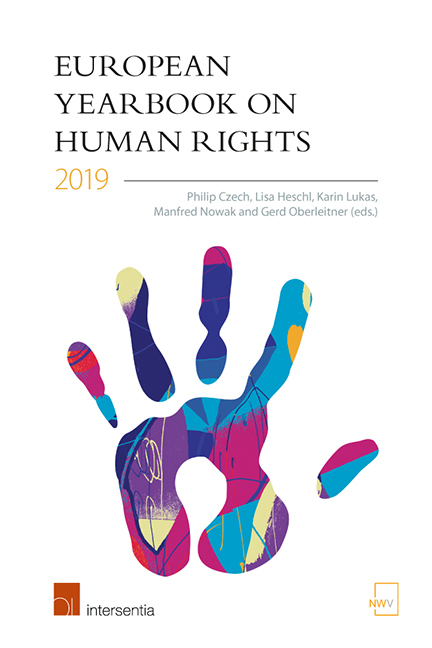Book contents
- Frontmatter
- Miscellaneous Frontmatter
- Editors’ Preface
- Contents
- List of Abbreviations
- List of Contributors
- PART I TOPIC OF THE YEAR
- PART II EU
- PART III CoE
- PART IV OSCE
- PART V REPORTS FROM THE FIELD
- PART VI OTHERS
- The Legal Authority and Recognition of the Universal Declaration of Human Rights: Conceptions, Developments and Practice
- Teaching Human Rights at School: A Survey of Persisting Challenges to the Practice
- Human Rights Implications for Vulnerable Migrants in Light of the EU and Italian Migration Policies
- The Russian Constitutional Court as a Mediating Link between Russian and European Law?
- PART VII BOOK REVIEWS
- Index
The Legal Authority and Recognition of the Universal Declaration of Human Rights: Conceptions, Developments and Practice
from PART VI - OTHERS
Published online by Cambridge University Press: 24 January 2020
- Frontmatter
- Miscellaneous Frontmatter
- Editors’ Preface
- Contents
- List of Abbreviations
- List of Contributors
- PART I TOPIC OF THE YEAR
- PART II EU
- PART III CoE
- PART IV OSCE
- PART V REPORTS FROM THE FIELD
- PART VI OTHERS
- The Legal Authority and Recognition of the Universal Declaration of Human Rights: Conceptions, Developments and Practice
- Teaching Human Rights at School: A Survey of Persisting Challenges to the Practice
- Human Rights Implications for Vulnerable Migrants in Light of the EU and Italian Migration Policies
- The Russian Constitutional Court as a Mediating Link between Russian and European Law?
- PART VII BOOK REVIEWS
- Index
Summary
ABSTRACT
Although the Universal Declaration of Human Rights (UDHR) was adopted as ‘merely’ a resolution of the United Nations (UN) General Assembly and is formally classified as soft law, its role in and significance for the development of human rights (both on the international and domestic planes) from political aims to legal norms have been invaluable. Up to today, all of the material content of the UDHR has been translated (incorporated) into treaty law adopted under the auspices of the UN and regional organisations. Thus, can we speak about the UDHR in the past tense, as a historical milestone whose practical relevance is gradually diminishing? Examples provided in the contribution suggest that this is not the case. The UDHR is still regarded as a reference human rights instrument in the treaties, soft law, case law, domestic legislation, and practice of international organisations and States. Notwithstanding its unquestionable authority within the system of human rights, the legal and binding normative character of the UDHR itself has been debated in international law scholarship ever since its adoption. The 70th anniversary of the Declaration is the right moment to recapitulate the past scholarship on the issue of the legal status of the UDHR and look into its current recognition. The contribution thus briefly addresses the question of the customary character of the Declaration in toto and of its individual provisions. The main focus is however on the examples that suggest that the UDHR carries a particular legal weight, even if it is not a binding source of international law in the formal sense. The contribution explores how the normative authority and significance of the UDHR is (or could be) translated into its legal recognition, and attempts to trace its relevance and practical implications for domestic and international systems.
INTRODUCTION
Seventy years after the adoption of the UDHR one should be able to assert that human rights have their established position (politically and legally speaking) and that the universality of fundamental rights and freedoms is secured. So far all of the material content of the UDHR has been translated (incorporated) into treaty law adopted under the auspices of United Nations and regional organisations. Thus, can we speak about the UDHR in the past tense, as a historical milestone whose practical relevance is gradually diminishing?
- Type
- Chapter
- Information
- European Yearbook on Human Rights 2019 , pp. 471 - 494Publisher: IntersentiaPrint publication year: 2019



